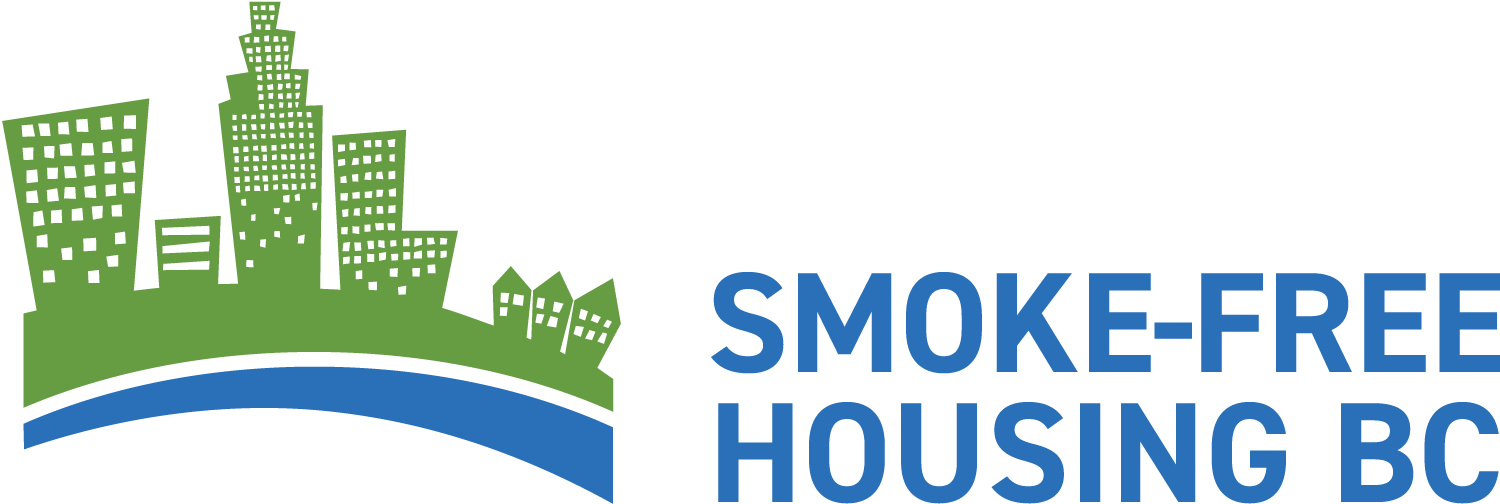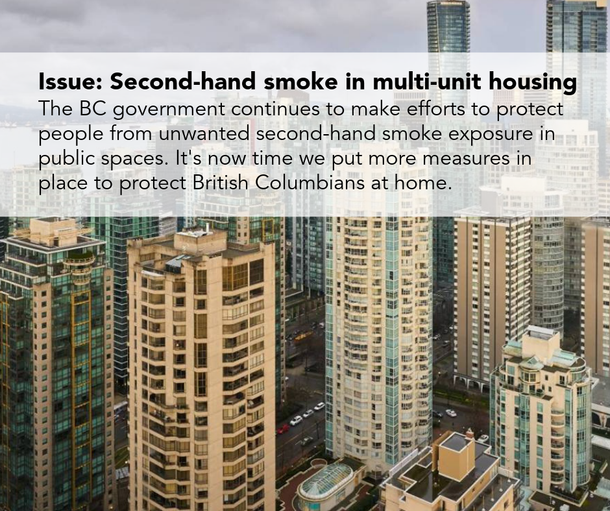


About Us
Our mission is to provide leadership and strategies to support people suffering from exposure to second-hand smoke in multi-unit housing and help increase supply of smoke-free housing in BC.
This website was created by the Heart and Stroke Foundation & the Canadian Cancer Society
with funding support from the Province of British Columbia.
The Heart and Stroke Foundation
A volunteer-based charity leading the way to eliminating heart disease and stroke through advancements in research, promotion of healthy living and advocacy.

About Us
Smoke-free housing BC has been working for decades on promoting smoke-free policies in apartments and condominiums. While British Columbians are protected from second-hand smoke in virtually all workplaces and public places, including many outdoor venues, parks and beaches, ironically there is no effective protection against smoke infiltrating people’s homes. Thousands of British Columbians are being forced to breathe other people’s smoke against their will, with few remedies to resolve the problem.
Despite the fact that BC has the lowest smoking rate in Canada, a 2018 survey we commissioned by Insights West found that over 50% of BC residents living in multi-unit housing are being involuntarily exposed to second-hand smoke coming from neighbouring units. This is up from 30% in 2008. This is especially hazardous for people living in public housing.
For many tenants, social housing providers are the landlord of last resort. Some people wait years to secure a subsidized unit, only to find themselves and their families forced to breath neighbouring cigarette/cannabis smoke on a daily basis. Unfortunately, many of these residents are already marginalized, with higher rates of disability and chronic disease, including respiratory disease, cancer and heart disease. Reducing risks like exposure to second-hand smoke could result in improved health outcomes for these residents who don’t have the option to move or escape the smoke.
Unfortunately, housing providers are often reluctant to act on complaints of second-hand smoke, and existing legal or regulatory remedies are often ineffective and expensive. With the current affordable housing crisis and record low vacancy rates, people cannot escape the smoke, even when their health is being severely compromised. Even when people can afford to move, smoke-free multi-unit housing options are scarce in BC.
COVID has exacerbated the problem of involuntary exposure to second-hand smoke in multi-unit housing complexes. Given that more people are working from their homes, exposure to second-hand smoke has increased considerably, which is especially problematic for young children, and other vulnerable populations such as the elderly and people with chronic health conditions. We have seen a marked increase in the number of people contacting us during this difficult time.
With almost half of BC households living in multi-unit housing, we strongly believe that creating more smoke-free multi-unit housing would improve the health of thousands of British Columbians who suffer from unwanted exposure to second-hand smoke. Further, adopting smoke-free policies in social housing would address the health inequities among vulnerable populations. There is a common misconception that banning smoking in social housing is a controversial policy because smoking is a hard addiction to break and it’s an unfair burden on disadvantaged individuals. However, the issue is not about targeting people who smoke - but protecting vulnerable residents – children, elderly and disabled – who are more susceptible to the health impacts of breathing second-hand smoke. Further, a non-smoking policy is not asking people to quit smoking. People who smoke are addicted to the nicotine and can find other ways of getting their nicotine that doesn’t affect the health of others, such as accessing nicotine replacement therapy offered free of charge by our provincial government. According to Dr. Stuart Kreisma, an endocrinologist at St. Paul’s Hospital in Vancouver and member of Physicians for a Smoke-Free Canada, “The smoker can choose where to smoke. Those affected by smokers cannot choose where to breathe.”
We believe that it is time for the provincial government to take a leadership role and make all public multi-family housing units 100% smoke-free. We recognize that there would need to be time for consultations with key stakeholders in the public housing sector to address resident concerns and implementation issues. For instance, when the US Department of Housing and Urban Development (HUD) implemented a 100% smoke-free policy for all Public Housing Authorities across the US, HUD allowed one year for the policy to be implemented, during which time they worked with stakeholders, developed communications, and assured residents that they would be supported to find other areas to smoke or help with quitting if that was their choice.
In addition, while we get many complaints from residents living in affordable housing, we also hear from as many living in the private rental and strata sectors. We believe that much more needs to be done to create more smoke-free housing options in the private multi-family housing sector to effectively protect individuals and families from exposure to second-hand smoke. Further, our research confirms that seven in ten British Columbians support the provincial government making new market rate and social housing complexes 100% smoke-free.
For a list of recommendations we have made to the provincial government to increase smoke-free multi-unit housing supply, read our report entitled: The Case for Smoke-Free Multi-unit Housing: Why Government Action Cannot Wait
Many Thanks
Many thanks are due to the following organizations who have provided guidance, expertise and support over the years to create resources that promote smoke-free housing and provide solutions to second-hand smoke problems.
Condominium Home Owners Association of BC
BC Non-Profit Housing Association
Tenant Resource & Advisory Centre
Professional Association of Managing Agents
Vancouver Coastal Health Authority
Vancouver Island Health Authority
NOTE: The information and materials contained on this website are for informational purposes only and should not be construed as legal advice.
Site last updated — November 20, 2023

™ The heart and / Icon on its own and the heart and / Icon followed by another icon or words are trademarks of the Heart and Stroke Foundation of Canada.




